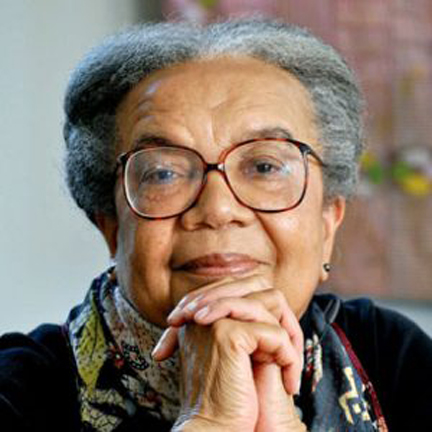Washington, D.C. — I feel that [my ancestors] do watch and guide, and I also feel that they join me in the hope that this story of our people can help alleviate the legacies of the fact that preponderantly the histories have been written by the winners.
– Alex Haley, from the conclusion of Roots
This August marked the centennial of the birth of Alex Haley, the Pulitzer Prize-winning author whose landmark book Roots opened so many eyes to the harsh truth about American slavery and its aftermath. In an era of renewed debate over who gets to tell the histories we teach our children, his legacy is as significant as ever.
Roots’ 1976 publication came at a seminal moment in American history. Cities across America were hosting celebrations of the nation’s bicentennial and the founding creed set forth in the Declaration of Independence: “We hold these truths to be self-evident, that all men are created equal, that they are endowed by their Creator with certain unalienable Rights, that among these are Life, Liberty and the pursuit of Happiness.” But at the 1963 March on Washington, Dr. Martin Luther King, Jr. reminded our nation and world that America had never fully lived up to that promise: “When the architects of our republic wrote the magnificent words of the Constitution and the Declaration of Independence, they were signing a promissory note to which every American was to fall heir. This note was a promise that all men, yes, black men as well as white men, would be guaranteed the ‘unalienable Rights’ of ‘Life, Liberty and the pursuit of Happiness.’ It is obvious today that America has defaulted on this promissory note insofar as her citizens of color are concerned. Instead of honoring this sacred obligation, America has given the Negro people a bad check, a check which has come back marked ‘insufficient funds.’”
With Roots, Alex Haley provided an epic lesson in American history through the story of his American family—slavery from the enslaved people’s point of view. His book spent months on the bestseller list and the 1977 television adaptation shattered viewing records as it gave tens of millions of people a visual, visceral experience of the true horrors of slavery. For the first time descendants of slaves, descendants of slave owners, and people of all backgrounds were sharing a common experience and understanding of America’s original sin whose aftereffects still radiate across our land. Acknowledging that truth together was a transformative experience.
Over the last year we have seen a welcome surge of new commitments and new willingness to confront the truth about American history, especially the ugly legacies of slavery and Native American genocide. But predictably, we are also seeing retrenchment and backlash from familiar corners. We must remain firmly committed to telling the truth about our history and promoting dialogue about the ways today’s structural, cultural, racial, and economic inequalities reflect the seeds from our violent past of genocide, slavery, and Jim Crow which still poison the soil and political discourse of our nation. Only confronting the truth about our nation’s profound birth defects and struggling deliberately to overcome them with open eyes, hearts, minds, and deeds will set us free.
In 1994 the Children’s Defense Fund (CDF) bought Alex Haley’s 157-acre farm in Clinton, Tennessee to engage people of all ages, races, and faiths in this continued struggle and in servant leadership development, intergenerational, interfaith, and interracial dialogue, and spiritual renewal. Every year faith leaders gather for spiritual retreats and great preaching, and young leaders come to learn from elders about nonviolent strategies for seeking racial and economic justice. Gurgling creeks run through the property, mountains lurk in the background, and trees rustle in the wind. Thanks to the generosity of Barnes and Noble founder and chair Len Riggio and his wife Louise, Haley Farm has been blessed as the only place with two Maya Lin-designed buildings in existence: the Langston Hughes Library, with its Maya Angelou and John Hope Franklin reading room, and the Riggio-Lynch Chapel. I have been struck by how many of the thousands of people who have come through Haley Farm’s gates say it feels like home and the communities we once experienced. It is a smoke free, drug free, alcohol free, violence free, and hate free environment grounded in love and mutual respect.
The largest annual gathering at Haley Farm brings together about 2,000 college-aged young people who train intensively to return to their local communities to teach thousands of children in CDF Freedom Schools® programs designed to stop summer learning loss, close the educational achievement gap, and empower children to make a difference in their schools, communities, nation, and world. They hear from leading educators, historians, and children’s and young adult book authors and discuss how to truthfully teach history to help children of all races understand our nation’s roots and how they can make a difference in closing the gaps in their communities between America’s dream and reality. Together they and all of us must help write the next chapter in our ongoing struggle to make America a more perfect union.
At the dedication of CDF Haley Farm, people of every race, faith, and discipline committed to help build a movement to Leave No Child Behind® and to ensure every child a healthy start, a head start, a fair start, a safe start, and a moral start in life and successful passage to adulthood with the help of caring families and communities. That struggle must continue until the prophet Zechariah’s vision of “the city full of boys and girls playing in its streets”—safely and joyfully—is realized all over our violence-saturated land. I thank Alex Haley for reminding African Americans and all Americans of our roots, strengths, struggles, courage, faith, and God-given human capacity to overcome adversity.







